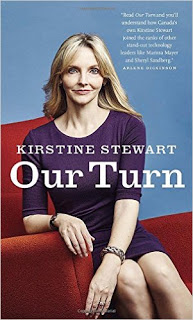Lately most of my book recommendations have been shared as short items in my monthly “Favourite Things” posts, and not as full posts on their own, but when I reached the end of Kirstine Stewart’s Our Turn and realized how many pages I had dog-eared, I knew it was worth some extra attention here on the blog.
My friend Sarah Newcomb (from Sleeping is For Losers) and I were excited to attend Canadian Living’s evening with Kirstine Stewart (now the VP of Media for Twitter) last week (yes, I’m a sucker for events with “VIP” in the title), and as part of our amazing swag we received a signed copy of Our Turn. (Um, yes, I just used three sets of parentheses in one sentence. I have a problem!)
I cracked the book open as soon as I could, and while there’s lots of reading material out there now about women and leadership, there were many new gems in Stewart’s book.
For me, with a career in education, I feel like the sexism that’s seen in other sectors isn’t quite as apparent. Even when it comes to advancement, our current Director of Education is a woman, as are five of our Board’s six Superintendents. I have worked for strong women as well as strong men, and I don’t feel that my gender would be a detriment, should I decide to pursue higher positions of leadership.
While I don’t currently feel as compelled by the work associated with the jobs higher up the educational ladder as I do with the front line work in the classroom, I love Stewart’s point about being a leader anywhere:
“But what’s truer today than ever before is that the dispersal of power within business” (and, I would add, education) “means you don’t have to be the boss to be a leader…A career worth having is not about collecting titles, but about the experience you get along the way.”
The only thing I would say I didn’t like about the book (which is strictly personal opinion) is that I wanted even more of Kirstine’s own stories. I totally understand that research is helpful to back opinion, especially in a book like this, but since I’m much more interested in personal narrative than data, I skimmed over some of the “According to a 2008 study…” tidbits. However, I soaked up every word of sentences that opened like “When I arrived at Alliance Atlantis…” (Throughout Stewart’s career in television, she made household names of talented folk like Debbie Travis and Sarah Richardson, which I found fascinating.)
Some of my other favourite words of wisdom from Kirstine Stewart in Our Turn:
***
“Leading involves the ability to inspire others to contribute,” (so true in education) “but to do that, I think first you have to be inspired yourself.”
***
“The first thing a leader” (teacher? principal?) “needs is the trust, respect and support of her team, because trust encourages constructive criticism, disagreement and healthy debate. And though trust and respect is a two-way street built between leader and team, it’s up to leaders to set the example.”
***
Stewart added “collaboration, trust and communicating with co-workers” as performance indicators in executive senior staff reviews (no one could earn a bonus if they didn’t pass that test) and feels these soft skills “should be considered part of any performance review.”
***
“To me, that’s how we need to lead today: being there at the top to clearly express the aims, set goals and expectations, ensure people have what they need to get to work, and then get out of the way so they can get the job done.” (Somewhat like being a teacher, perhaps?)
***
“If you never fail, it means you are never trying anything new.”
***
“When people, usually women, ask about my professional achievements, I can honestly say they have had more to do with taking chances than setting a career goal…I am anti five-year plan because in my experience the best things do not flow from making plan and sticking to it.”
***
“Why would I give more weight to the negative comments than those that were supportive?…Use the positive support around you to build the resilience you need to deal with the negative.” (Who doesn’t need to remember that?)
***
I actually tweeted the author to ask her if she had a tip for primary teachers, trying to raise little leaders. Here’s what she replied:
@thismomloves they are at the best age to develop their empathy, listening skills. Playground rules are great business rules #BeNice #share
— Kirstine Stewart (@kirstinestewart) October 30, 2015
Finally, I love how the writer and researcher who helped Stewart with Our Turn made it, by name, into the acknowledgements section at the end of the book, which affirms that we don’t need to be ashamed to say that we all have help. “I pride myself on the ability to build great teams,” she points out. That’s leadership.



